African Expats Fight to Stay in Guangzhou as Policies Tighten
Posted: 07/18/2014 11:39 am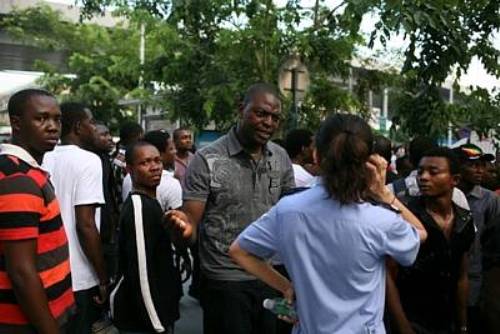 While many expatriates from African countries have succeeded in business in Guangzhou, Chinese policies are making it more difficult for them, and other foreigners, to continue the lives they’ve made for themselves in China.
While many expatriates from African countries have succeeded in business in Guangzhou, Chinese policies are making it more difficult for them, and other foreigners, to continue the lives they’ve made for themselves in China.
African countries are being courted by Chinese officials who insist, “China wants to engage every African country as an equal.” However, that sentiment doesn’t seem to be afforded to the residents of these countries.
Last year, the Chinese central government passed the Exit-Entry Administration Law that now requires expats to return to their home nations to renew their visas instead of doing so at intermediary destinations like Hong Kong. Jenni Marsh from the South China Morning Post recently detailed how this policy is impacting the African expat community in Guangzhou. While many people Marsh interviewed plan to return to their home countries in Africa, many others are resolved to carve out a long-term existence in Guangzhou.
The African community has galvanized and fought for longer visa extensions by proving how much they have given back to their newly-adopted city. As a result, visas procured by members of the African community can range from around three months to three years, depending upon the individual’s personal circumstances. And yet, a double standard remains as a Guinean trader named Cellou complained, “If my [Chinese] wife stays in Guinea she can get a Guinea passport.”
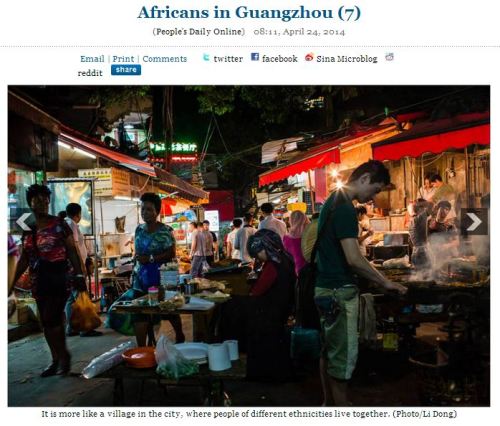 Even before the Exit-Entry Administration Law was passed last year, the African community in Guangzhou was already under pressure with the Guangdong Act of 2011. The Act rewards people who snitch on those who overstay their visas, forbids illegal immigrants to work or study, and gives any police officer the authority to stop foreigners to verify their passports. A Ugandan told Lan Shanshan, a research assistant professor at Baptist University:
Even before the Exit-Entry Administration Law was passed last year, the African community in Guangzhou was already under pressure with the Guangdong Act of 2011. The Act rewards people who snitch on those who overstay their visas, forbids illegal immigrants to work or study, and gives any police officer the authority to stop foreigners to verify their passports. A Ugandan told Lan Shanshan, a research assistant professor at Baptist University:
“A visa is not a 100 per cent guarantee here. When police stop you, if you do not look like a pleasant person to them, they may draw the line on your visa and cancel it. They say, ‘China gives, China takes.’”
While staying in China may be difficult for African expats, they have still found a way to improve their odds: by marrying a Chinese wife. Linessa Lin Dan, a PhD student at the Chinese University of Hong Kong, said many African expats will marry a Chinese wife for business reasons.
“Opening a shop is very difficult for foreigners,” she says. “You need a Chinese passport or the landlord will ask for a bribe. A Chinese wife can speak to suppliers. It’s useful to have a Chinese partner.
“Many Chinese women want to marry Africans because they are from poor rural areas, often Hunan or Hubei provinces. Marrying a foreigner is a way to upgrade their social status, because the Africans have money.”
This sentiment is seconded by Pat Chukwuonye Chike:
“That is my sacrifice,” says the married father-of-two. “My wife cannot cook. My mother-in-law helps look after the children, and she is poisoning them against Africa. She’s an old woman, she knows the game she’s playing. There is crisis everywhere–terrorists were in Guangzhou last week–it is a sin to make my children scared of Nigeria.”
But perhaps the biggest problem facing the African community of Guangzhou is how to deal with mixed-race children. These kids are born predominantly to an African father and a Chinese mother and are caught between cultures. Chinese immigration policies threaten to separate those families.
While the one-child policy does not include foreigners, Africans are subject to the policy even though they do not qualify for Chinese citizenship. Furthermore, these mixed-race children risk being marginalized by a classification system that does not recognize “mixed-race” as an option.
Even the local media treatment has been mixed:
Lan Shanshan, a research assistant professor at Baptist University, claims there is a media edict on the mainland to report favourably on Africans in China, hence the state-owned newspaper Guangming Daily’s three-part special titled “Friends From Africa, How are You Doing in Guangzhou?”, in 2012.
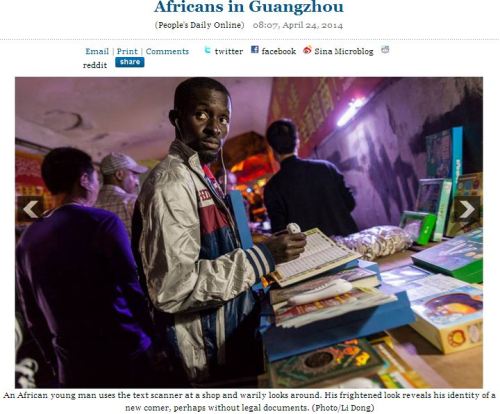 And yet, we’ve seen pictorials by the People’s Daily that insinuate an unidentified African person to be an illegal immigrant, while news reports flat out finger the African community as the source of blame for the drug woes currently plaguing China.
And yet, we’ve seen pictorials by the People’s Daily that insinuate an unidentified African person to be an illegal immigrant, while news reports flat out finger the African community as the source of blame for the drug woes currently plaguing China.
Regardless, it is becoming more difficult everyday for an African expat to stay in China.
Photo: Sinovision.net, the Nanfang



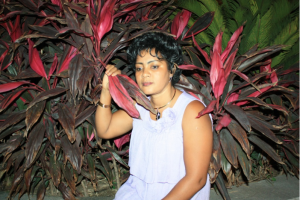
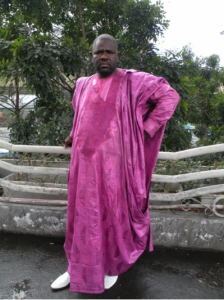

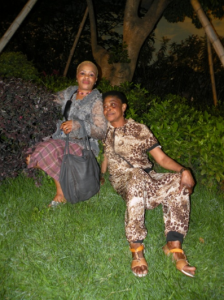
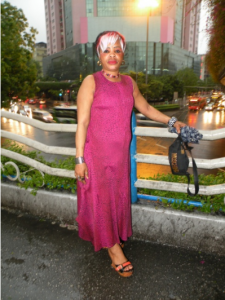
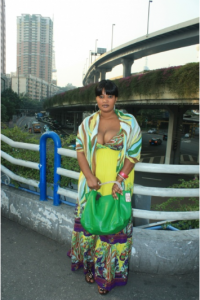










China Insider: Why a Racist Quote in People’s Daily Online Isn’t Racist At All
Posted: 04/25/2014 8:35 pmA quote given in a pictorial seen on the People’s Daily Online is not racist at all.
While a picture can tell a thousand words, we’ll let the actual written words speak for themselves in this case:
Yeah, that seems to be unfairly judging a person you don’t know anything about with a biased preconception. But, this caption isn’t racist because we’re not getting the full picture here: the true way to enjoy this pictorial is not by the pictures, but through the photographer.
The photo essay is about the African community that resides in Guangzhou. Estimated to have originated in 2002, “Africatown” was the coalescence of a number of Africa traders that continually grew year by year. However, the growth of Guangzhou’s Africatown seems to rely upon the uneasy truce made between the African and Chinese communities which is founded upon the mutual ignoring of each other’s existence.
Well, that didn’t sit well with Li Dong. Two years ago, Li Dong quit his job and decided to fully document the African community in Guangzhou through photography.
But though we have Li’s many photographs of the African community, we really aren’t any closer to understanding them—not by the People’s Online pictorial and it’s rather direct-yet-ambiguous statement. Instead, we need the proper context to relate with—and for that, we have Li Dong himself.
The full story about the African community photographs broke back on April 10, and it did it by telling us about Li Dong: his life, his history, his accolades. The introduction to the story starts off grandly like this:
And then majestically reveals the purpose:
And then it goes on to tell everything about Li. We are told of Li’s disgrace of losing face as a child when he saw the way Chinese would act around foreigners, and then Li explains how his work is required understanding to achieve a cultural advantage:
Yes, we need to know the all the motivations why someone would do something like this. We need to know that the person doing this is a person of high standing and privilege, after which we can extend our respect to the things he stands for by proxy. Yes, we need read the background first in order to give the proper respect, and then understand later.
The story of the African community in China is in fact Li’s story of why he was compelled to quit his job and devote an entire two years of his life to this project when a weekend wouldn’t do. We don’t need a pictorial telling the stories about the African community in Guangzhou because the real story we need to hear is the one that’s trying to tell it.
And let’s be fair to that quote by the People’s Daily Online: they did say “perhaps”.
Photos: People’s Daily Online